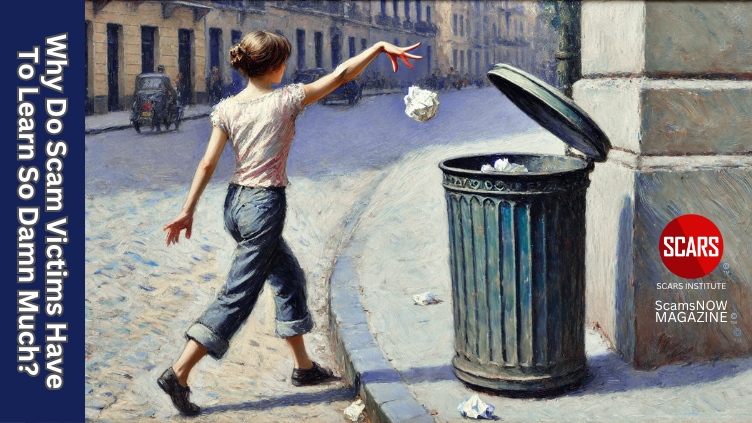
Origami and Refolding Your Life for Recovery
The Origami Of Trauma & Refolding Your Life
Primary Category: Scam Victim Recovery Psychology // Scam Victim Recovery Philosophy
Author:
• Tim McGuinness, Ph.D., DFin, MCPO, MAnth – Anthropologist, Scientist, Polymath, Director of the Society of Citizens Against Relationship Scams Inc.
About This Article
Origami is not just the art of folding paper: it is a metaphor for life after trauma and a practical tool for healing. The process teaches you how to work with what exists, rather than wishing for a blank slate. Each fold represents a choice, a change, or a life event, some intentional and some accidental. Just like trauma leaves emotional creases that cannot be undone, Origami reminds you that healing involves refolding, not erasing. The practice builds mindfulness by requiring focused attention, steady breathing, and acceptance of imperfection. It regulates emotional states by calming the nervous system and providing a tangible way to process complexity step by step. Mistakes do not ruin the design; they become part of it, teaching resilience and flexibility. Origami also fosters connection with others through shared quiet focus, making it a powerful therapeutic activity for those coping with trauma, anxiety, or grief. It shows you that life’s folds can lead to beauty, even when the original shape is forever changed.
Note: This article is intended for informational purposes and does not replace professional medical advice. If you are experiencing distress, please consult a qualified mental health professional.

The Origami Of Trauma & Refolding Your Life
What is Origami?
Origami, at its core, means “folded paper”, from the Japanese words ori (to fold) and kami (paper). However, its deeper meaning goes beyond literal folding.
Origami symbolizes transformation through subtle action. It represents the idea that something simple and ordinary, a plain sheet of paper, can be changed into something intricate, meaningful, and beautiful without adding or removing anything. The paper is not cut or altered in substance. It is reshaped through process, patience, and precision.
At a philosophical level, Origami reflects the impermanence and adaptability of form. It teaches that change is not about destruction or replacement, but about reconfiguration. Folds create new possibilities. Mistakes become part of the structure, not reasons to abandon the work.
Origami also carries the idea of intentional creation through limitation. The art imposes strict rules: one sheet, no cuts, no glue. This discipline emphasizes creativity within boundaries, mirroring the human condition. People cannot erase their pasts or escape reality, but they can refold their experiences into new shapes.
In this sense, Origami means transformation without loss, creativity within constraint, and the beauty of becoming something new while still containing the history of what was before.
Applying Origami to Scam Victim Trauma
The philosophy of Origami offers a meaningful metaphor for trauma recovery.
Origami is not just about folding paper into shapes. It is about transformation through structure, intention, and patience.
A single flat sheet becomes something new through careful folds. Even when the folds seem complex or irreversible, the paper still holds potential for change.
Trauma acts like forced folding. It bends life into unnatural shapes. It creates creases that feel permanent, distorted patterns of thought, emotional reflexes, and habits that trap the person in pain.
Trauma does not just mark the mind. It reshapes identity, relationships, and the sense of purpose.
The question is whether the mind, like paper, can be unfolded and refolded into something meaningful. The answer is yes, but it requires conscious effort.
Recovery is not about returning to the original flat state. That is impossible. The paper has been folded. The life has been changed. Trauma leaves imprints that cannot be erased. But like Origami, those folds can be reworked. They can be softened, redirected, and integrated into new designs.
In trauma recovery, the process begins with awareness. A person has to see the patterns clearly. This means acknowledging the folds, understanding how the trauma shaped thoughts, feelings, and behaviors.
Then comes the gentle work of unfolding. This is where therapy, education (SCARSeducation.org), self-reflection, and emotional honesty play roles. The mind is taught to open back up, to loosen the creases that no longer serve a purpose.
Next comes refolding. This step is about creating new meaning from what remains. Life will never return to what it was before trauma. But it can be shaped into something resilient, beautiful, and intentional.
The scars become part of the new pattern. They are not hidden. They are incorporated into the design.
The philosophy of Origami teaches patience, respect for the material, and the art of deliberate creation. Applied to trauma, it becomes a guide for rebuilding a life, not by denying the damage, but by transforming it into a new form of strength and beauty.
Origami as a Path to Mindful Transformation
Origami is more than an art form. It is a practice that teaches resilience, patience, and the creative potential of constraint.
When you fold a sheet of paper, you engage in a process that mirrors life itself. The paper begins as something flat and simple, much like your life before trauma or transformation. Each fold changes the structure permanently.
The creases cannot be undone, but they can be refolded. This becomes a living metaphor for emotional growth and recovery.
Learning to Work With What Exists
Origami teaches you to work with what exists, not what you wish existed. The paper has limits. You cannot add more to it, and you cannot erase mistakes by starting over endlessly.
You learn to adjust, adapt, and integrate each fold into the final design. This reflects the core challenge of trauma recovery. You cannot erase your experiences.
You cannot go back to the person you were before. Healing means accepting the folds life has already made and finding ways to transform them into something meaningful.
Mindfulness Through Folding
The practice of folding paper requires focused attention. Your hands cannot rush, or the paper will tear. Your mind cannot drift, or the pattern will break.
Each fold demands presence. This creates a natural form of mindfulness. You stay in the moment because the process requires it.
Folding paper quiets the mind by giving it a gentle, tactile task that absorbs anxious energy without forcing stillness. The simple act of folding becomes a meditation on patience, precision, and acceptance.
When you practice Origami mindfully, you learn to breathe with each step. You watch your hands move. You notice the paper’s texture and resistance.
The creases become records of choices, just like the emotional folds in your life.
Some folds feel smooth. Others feel forced. Both become part of the design.
Over time, you stop criticizing the imperfect lines and start appreciating the unique form that emerges.
Embracing Mistakes as Part of the Pattern
Origami teaches that mistakes do not end the process. They become part of it. A fold made in the wrong direction can lead to a new design. A wrinkle does not ruin the paper; it adds texture to the final piece.
This mirrors the psychological work of integrating trauma. Healing does not mean erasing damage. It means learning to incorporate it into the story of who you are now.
Each mistake becomes a lesson in flexibility and adaptation.
This practice helps reduce perfectionism and fear of failure. When you fold paper, you accept that not every piece will look like the picture in the instructions. Some folds lead to unexpected results. The point is not perfection. The point is process.
Building Emotional Regulation
Origami can help regulate emotional states. When you feel overwhelmed, folding paper slows your breathing and grounds your attention. It gives your hands something constructive to do while your mind calms.
The rhythmic motion of folding paper creates a somatic experience that helps the nervous system shift from panic to focus.
This is especially valuable for people coping with trauma, anxiety, or grief. The act of folding becomes a physical reminder that you can handle complexity one step at a time.
Symbolic Healing Through Re-Folding
Trauma folds life into distorted patterns. You may feel crumpled, twisted, or stuck in shapes you did not choose. Origami offers a symbolic way to approach this.
You take a sheet of paper and fold it intentionally. You watch the structure change in your hands. You see how one small fold leads to the next, and how the final form emerges from patience, not force.
This teaches you that life can be refolded, too.
The process gives you a sense of agency. You cannot return the paper to its original state, but you can choose how to fold it next. This mirrors emotional recovery. You cannot erase the past, but you can change what you do with it.
A Practice for Connection and Community
Origami can also serve as a tool for connection. Folding paper with others creates shared focus without the need for deep conversation.
This makes it accessible for people who find verbal processing difficult. In support groups or therapy sessions, Origami can become a gentle way to build community. It allows for quiet presence while still fostering emotional support.
Conclusion: Folding Life Into Something New
Origami teaches that transformation does not require starting over. It requires working with what exists and finding beauty in the process. Each fold becomes part of a story.
Some folds come from trauma, loss, or betrayal. Others come from healing, learning, and growth. The paper never returns to its flat, original state, and neither do you. That is not failure. That is life.
By using Origami as a mindfulness tool, you learn to slow down, accept imperfection, and embrace the ongoing work of refolding your life into something meaningful.
Each crease holds a lesson. Each step forward shapes something new.
-/ 30 /-
What do you think about this?
Please share your thoughts in a comment below!
Important Information for New Scam Victims
- Please visit www.ScamVictimsSupport.org – a SCARS Website for New Scam Victims & Sextortion Victims.
- SCARS Institute now offers its free, safe, and private Scam Survivor’s Support Community at www.SCARScommunity.org – this is not on a social media platform, it is our own safe & secure platform created by the SCARS Institute especially for scam victims & survivors.
- SCARS Institute now offers a free recovery learning program at www.SCARSeducation.org.
- Please visit www.ScamPsychology.org – to more fully understand the psychological concepts involved in scams and scam victim recovery.
If you are looking for local trauma counselors, please visit counseling.AgainstScams.org
If you need to speak with someone now, you can dial 988 or find phone numbers for crisis hotlines all around the world here: www.opencounseling.com/suicide-hotlines
Statement About Victim Blaming
Some of our articles discuss various aspects of victims. This is both about better understanding victims (the science of victimology) and their behaviors and psychology. This helps us to educate victims/survivors about why these crimes happened and not to blame themselves, better develop recovery programs, and help victims avoid scams in the future. At times, this may sound like blaming the victim, but it does not blame scam victims; we are simply explaining the hows and whys of the experience victims have.
These articles, about the Psychology of Scams or Victim Psychology – meaning that all humans have psychological or cognitive characteristics in common that can either be exploited or work against us – help us all to understand the unique challenges victims face before, during, and after scams, fraud, or cybercrimes. These sometimes talk about some of the vulnerabilities the scammers exploit. Victims rarely have control of them or are even aware of them, until something like a scam happens, and then they can learn how their mind works and how to overcome these mechanisms.
Articles like these help victims and others understand these processes and how to help prevent them from being exploited again or to help them recover more easily by understanding their post-scam behaviors. Learn more about the Psychology of Scams at www.ScamPsychology.org
SCARS INSTITUTE RESOURCES:
If You Have Been Victimized By A Scam Or Cybercrime
♦ If you are a victim of scams, go to www.ScamVictimsSupport.org for real knowledge and help
♦ SCARS Institute now offers its free, safe, and private Scam Survivor’s Support Community at www.SCARScommunity.org/register – this is not on a social media platform, it is our own safe & secure platform created by the SCARS Institute especially for scam victims & survivors.
♦ Enroll in SCARS Scam Survivor’s School now at www.SCARSeducation.org
♦ To report criminals, visit https://reporting.AgainstScams.org – we will NEVER give your data to money recovery companies like some do!
♦ Follow us and find our podcasts, webinars, and helpful videos on YouTube: https://www.youtube.com/@RomancescamsNowcom
♦ Learn about the Psychology of Scams at www.ScamPsychology.org
♦ Dig deeper into the reality of scams, fraud, and cybercrime at www.ScamsNOW.com and www.RomanceScamsNOW.com
♦ Scam Survivor’s Stories: www.ScamSurvivorStories.org
♦ For Scam Victim Advocates visit www.ScamVictimsAdvocates.org
♦ See more scammer photos on www.ScammerPhotos.com
You can also find the SCARS Institute’s knowledge and information on Facebook, Instagram, X, LinkedIn, and TruthSocial
Psychology Disclaimer:
All articles about psychology and the human brain on this website are for information & education only
The information provided in this and other SCARS articles are intended for educational and self-help purposes only and should not be construed as a substitute for professional therapy or counseling.
Note about Mindfulness: Mindfulness practices have the potential to create psychological distress for some individuals. Please consult a mental health professional or experienced meditation instructor for guidance should you encounter difficulties.
While any self-help techniques outlined herein may be beneficial for scam victims seeking to recover from their experience and move towards recovery, it is important to consult with a qualified mental health professional before initiating any course of action. Each individual’s experience and needs are unique, and what works for one person may not be suitable for another.
Additionally, any approach may not be appropriate for individuals with certain pre-existing mental health conditions or trauma histories. It is advisable to seek guidance from a licensed therapist or counselor who can provide personalized support, guidance, and treatment tailored to your specific needs.
If you are experiencing significant distress or emotional difficulties related to a scam or other traumatic event, please consult your doctor or mental health provider for appropriate care and support.
Also read our SCARS Institute Statement about Professional Care for Scam Victims – click here
If you are in crisis, feeling desperate, or in despair, please call 988 or your local crisis hotline – international numbers here.
More ScamsNOW.com Articles
A Question of Trust
At the SCARS Institute, we invite you to do your own research on the topics we speak about and publish. Our team investigates the subject being discussed, especially when it comes to understanding the scam victims-survivors’ experience. You can do Google searches, but in many cases, you will have to wade through scientific papers and studies. However, remember that biases and perspectives matter and influence the outcome. Regardless, we encourage you to explore these topics as thoroughly as you can for your own awareness.















![NavyLogo@4x-81[1] Origami and Refolding Your Life for Recovery - 2025](https://scamsnow.com/wp-content/uploads/2025/04/NavyLogo@4x-811.png)










![scars-institute[1] Origami and Refolding Your Life for Recovery - 2025](https://scamsnow.com/wp-content/uploads/2025/04/scars-institute1.png)

![niprc1.png1_-150×1501-1[1] Origami and Refolding Your Life for Recovery - 2025](https://scamsnow.com/wp-content/uploads/2025/04/niprc1.png1_-150x1501-11.webp)